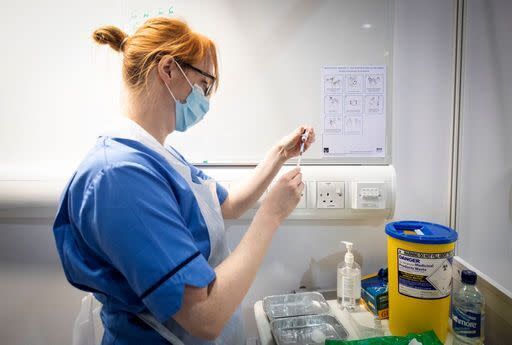Women health and care workers need action to improve their lives, not more alarming reports

The findings of a new survey by the NHS Confederation’s Health and Care Women Leaders Network (HCWLN) show the impact of the pandemic on the mental and physical wellbeing of women working in health and care has got demonstrably worse since the summer. This is an alarming result, suggesting that the longer the pandemic goes on, the worse the impact on the female workforce in particular.
But the time for reports has passed. Action must come next. This is writ large by the fact that more than 80 per cent of female respondents who completed the survey, which follows a similar poll carried out in June, said their job had a greater negative impact than usual on their emotional wellbeing as a result of the pandemic, up from 72 per cent last summer. The results also showed 65 per cent reported a greater negative impact on their physical health – a 13-percentage-point jump from the last survey.
It’s also well-established that caring responsibilities outside work fall disproportionately to women, and the survey found these responsibilities have grown significantly since the summer for female staff. Having children was also linked to more hours spent in caring responsibilities beyond work, likely because of the prolonged closure of schools and reduced working hours. It’s also established there can be serious implications for career progression because of this.
The survey does bring out some of the positive experiences female staff have reported during the Covid-19 crisis, such as increased opportunities for flexible working and improved teamwork.
But the evidence gathered in the report, and by so many others, casts a harsh light on how far we still have to go to achieve gender equality in the health and care workplace: policies still need to be changed; economic disparities, including on gender pay, must be rectified; and barriers must still be torn down in the workplace and elsewhere.
The average age of the women who responded to the survey on which the report was based was about 47. True gender equality may not be achieved in their lifetime, or even that of their children – all the more reason, therefore, to take action now. It’s beholden on all of us to lobby for change, however small that change may be, for even small actions can make waves. If we believe in inclusive and fair cultures, it is our responsibility to help shape them.
Leaders and key decision makers across health and care must reflect the diversity of the workforce, and that means more women must be able to progress to senior roles across the sectors. In our September 2020 report with the University of Exeter, Action for Equality: The Time is Now, we set out the state of play in terms of equal gender representation on NHS boards, including the fact that we still need 150 more women in board-level positions to reach parity. Of course, no one would wish to be appointed to a board level position as a token – they want to be there knowing they were selected as the best person for the role. But to make this possible, we must remove the obstacles to progress – not tomorrow, not next week, not next year. Now.
That is why the HCWLN exists: to ensure all women working in health and care have access to a platform that will support their aspirations, raise awareness of the barriers they face in the workplace, scrutinise policies that may hold them back, and ultimately improve gender equality at all levels. Over the coming months, our aim is to develop the network as an agent for change, able to influence, to drive shifts in culture and to amplify voices to promote equality, diversity and inclusion across health and care.
The government is now calling for evidence to inform a women’s health strategy. As the largest employer in the UK, with more than 1.2 million employees in England and with 78 per cent of employees identifying as women, the NHS should have its own women’s health strategy for its staff, making it an exemplar employer for the UK. The HCWLN will be recommending that such a strategy is designed and implemented across health and care.
Samantha Allen is chair of the Health and Care Women Leaders Network and chief executive of Sussex Partnership NHS Foundation Trust
Read More
People think ‘H’ was based on Boris Johnson. But what if the real ‘H’ is David Cameron?
You’re not the only one who found Bill and Melinda Gates’ divorce unsettling
Facebook, Liz Cheney and the Republican push for an end to democracy in 2024
